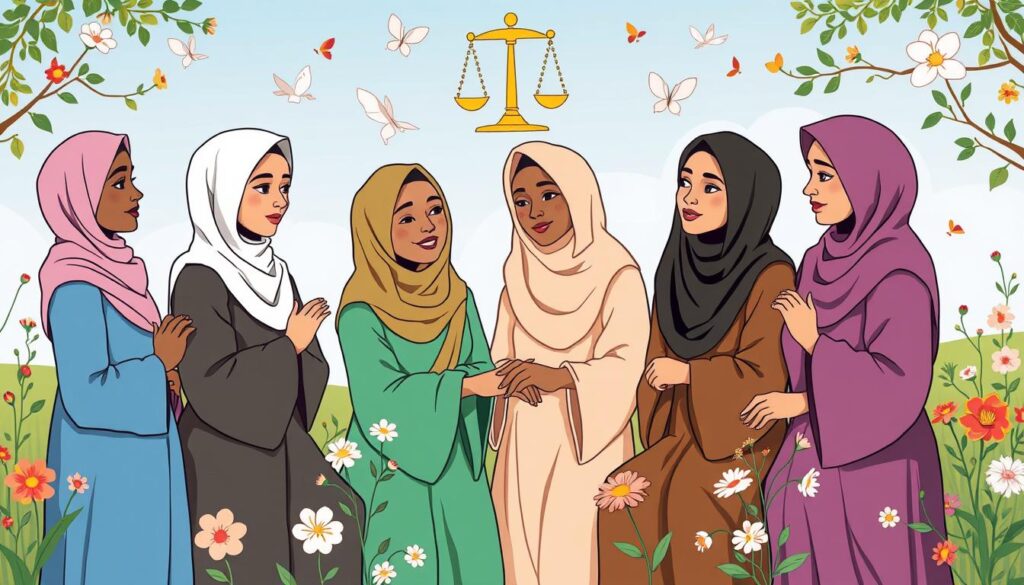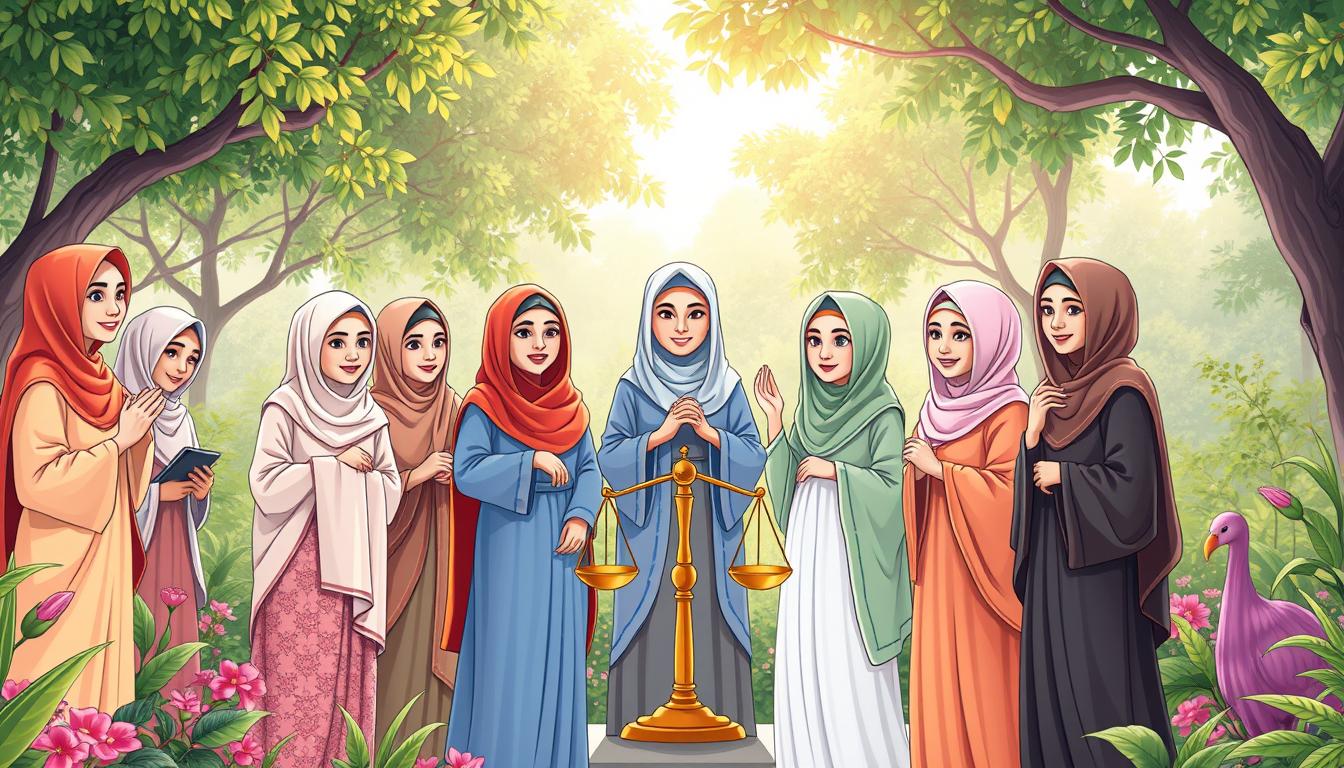Did you know there are over 1.57 billion Muslims worldwide? More than 60% live in Asia, and about 20% in the Middle East and North Africa. This shows how important it is to understand Women’s Rights in Marriage. At Umar Khan Charity Organization, we change lives through faith-based work. We invite you to join us.
Marriage in Islam is about love, respect, and equality between partners. It’s a sacred bond where spouses find comfort and love in each other. The Quran sees marriage as a sign of God’s creation, highlighting Women’s Rights in Marriage.
We want to build a community that cares, protects, and shares wisdom. We focus on actions and clear language with Islamic terms. Our goal is to change lives while staying true to Islamic values, starting with understanding marriage rights for women.
Introduction to Women’s Rights
Exploring Women’s Rights in Marriage shows how vital equality and respect are. Islamic teachings stress these values, laying a strong foundation for a happy marriage.
Key Takeaways
- Marriage is a sacred union in Islam, stressing mutual love and respect.
- Women have the right to accept or reject marriage proposals, showing the value of their consent.
- In divorce, women can start the process, highlighting their rights.
- Women’s Rights in Marriage are rooted in Islamic principles, ensuring equal rights to property and inheritance.
- Understanding marriage rights for women is key to faith-based humanitarian work and changing lives.
- Islamic teachings value fidelity, loyalty, and faithfulness in marriage.
The Historical Context of Women’s Rights in Marriage
We believe in the power of education and awareness in promoting positive change. Understanding the history of women’s rights helps us see how far we’ve come and what’s left to do. The journey of women’s rights in marriage is filled with ups and downs, shaped by different cultures and societies.
Islamic views on women’s roles have changed over time. They now focus on gender equality in marriage and women empowerment in marriage. Looking at how marriage laws have evolved in Islam gives us a glimpse into the ongoing fight for equality and justice.
- Married women’s property rights and their ability to enter into contracts
- The impact of religious teachings on women’s submission to their husbands
- The progress made in enacting laws to promote gender equality in marriage and women empowerment in marriage
As we move forward, it’s key to remember the role of education and awareness. By grasping the history of women’s rights, we can work towards a fairer society for everyone.
Learn moreabout the historical context of women’s rights in marriage. See how it has influenced our views on women empowerment in marriage and gender equality in marriage.
Key Principles of Islamic Marriage
Islamic marriage is built on key principles for a balanced and loving relationship. These principles help couples build a strong and fulfilling bond. Mutual respect, consent, and responsibility are key for a happy marriage.
Islamic marriage values mutual consent, respect, and responsibility. Women’s marital rights are a big part of this, ensuring women are treated with respect. The women’s role in marriage goes beyond just household chores, covering many responsibilities and rights.
Understanding the Nikah Agreement
The Nikah agreement is at the heart of Islamic marriage. It outlines the rights and duties of both partners. This agreement is a public promise of commitment, witnessed by two male or one male and two female witnesses.
Consent in Marriage: A Fundamental Right
Consent is a key right in Islamic marriage. Both partners must agree freely, without being forced. This ensures the marriage is based on mutual respect and understanding, not coercion.
Rights and Responsibilities of Spouses
Islamic marriage clearly defines the rights and duties of spouses. Husbands are expected to provide for their wives. Wives are responsible for managing the home and raising children.
In Islamic marriage, women’s marital rights are protected and respected. Women are treated with dignity and respect. The women’s role in marriage includes more than just household chores. It also includes education, employment, and financial independence.
Economic Rights of Women in Marriage
We know how key economic power is for women in marriage. They can make better choices for their lives and help their families when they know their rights. Islamic teachings stress the need for women to be financially supported in marriage. This includes dowry, financial help, and inheritance.
Some important economic rights for women in marriage are:
- Dowry: a payment made by the groom to the bride, which is her sole property
- Financial support: the husband’s obligation to provide for his wife’s financial needs
- Inheritance: a woman’s right to inherit property and assets from her family
These rights help promote marital equality for women. They ensure women can financially support themselves. By knowing and using their marital rights for women, women can build better marriages. They also help their families financially.
Social Rights and Marriage Dynamics
We think social support and community are key to healthy marriages. They help couples build a strong, loving bond. This is very important for women’s rights in relationships and gender equality in marriage.
Some key aspects of social rights and marriage dynamics include:
- Mutual respect and trust
- Decision-making and communication
- The role of extended family in marriage
These aspects are vital for a harmonious and balanced marriage. Both partners should feel valued and respected.
Islamic teachings highlight the importance of social rights and marriage dynamics. They help couples build a strong, loving relationship. This relationship is based on gender equality in marriage and women’s rights in relationships.

| Aspect | Importance |
|---|---|
| Mutual respect and trust | Essential for a harmonious and balanced partnership |
| Decision-making and communication | Crucial for promoting a strong and healthy relationship |
| The role of extended family in marriage | Important for providing social support and guidance |
Domestic Violence and Legal Protections
We understand the need to tackle domestic violence and offer legal safeguards for women. This issue impacts people from all walks of life, hitting women the hardest. Studies show that about 1 in 4 women face domestic violence at some point, showing how widespread and serious it is.
Domestic abuse can manifest in many ways, like physical, emotional, and sexual abuse. It’s vital to know the signs and where to find help. Empowering women in marriage and protecting their rights is key to stopping and dealing with domestic violence.
Survivors of domestic violence can find support through:
- Women’s shelters
- Domestic violence hotlines
- Healthcare providers
- Counseling centers
These resources are essential in helping survivors find safety and get the help they need.
Creating a safety plan is vital for leaving an abusive relationship. The danger can increase when trying to escape. We strongly oppose domestic violence and support legal protections for women. By knowing the signs and where to get help, women can find support and empowerment in marriage.
| Resource | Description |
|---|---|
| Violence Against Women Act (VAWA) | A federal law that addresses domestic violence and provides legal protections for women |
| Domestic violence hotlines | Confidential and free resources for survivors of domestic violence |
| Women’s shelters | Safe and supportive environments for survivors of domestic violence |
The Role of Education in Empowering Women
At Umar Khan Charity Organization, we see education as a game-changer for women. It lets them make smart choices and stand up for their women’s rights in marriage. Education opens doors to new possibilities and helps bring about positive change.
Islamic teachings highlight the value of education and knowledge. They see women as scholars and leaders. Marriage rights for women are linked to education too. Educated women can talk openly with their partners and seek fair, respectful relationships.
Education brings many benefits to women, including:
- Access to better healthcare
- Knowledge about reproductive health
- Lower rates of maternal death
- More chances to work and earn income
By ensuring equal education, we empower women to control their lives and fight for their women’s rights in marriage. As a community, we must support women in getting an education. This way, they can reach their full capacity.
| Education Level | Marriage Rate | Empowerment Level |
|---|---|---|
| Primary Education | 65% | Low |
| Secondary Education | 30% | Medium |
| Tertiary Education | 5% | High |
Cultural Practices vs. Islamic Teachings
We understand the need to separate cultural practices from Islamic teachings. This helps us grasp women’s rights in marriage better. By doing this, we can push for change and support positive reforms.
Islamic teachings are sometimes mixed with cultural practices. This can affect women’s rights in marriage. It’s key to tell the difference between tradition and religious teachings to truly understand women’s rights.
Distinguishing Tradition from Religious Doctrine
Cultural practices can be mistaken for Islamic teachings. This can lead to women’s rights being overlooked. It’s vital to know the difference and promote a clear view of women’s roles in marriage.
The Impact of Culture on Women’s Rights
Culture greatly influences women’s rights in marriage. It often restricts their choices and rights. We must support women’s marital rights and empower them to make informed decisions.
Some important points to remember include:
- The importance of consent in marriage, as shown in Surah An-Nisa 4:19 and Sahih Muslim, book 8, number 3303 and number 3305.
- The need to separate cultural practices from Islamic teachings for a better understanding of women’s rights.
- The role of culture in shaping women’s rights, and the need to empower and protect them.
By grasping the role of culture and promoting a nuanced view of women’s rights, we can advocate for change. This will help create a fairer and more just society for everyone.
| Islamic Teachings | Cultural Practices | Impact on Women’s Rights |
|---|---|---|
| Emphasize consent in marriage | Often limit women’s ability to make choices | Suppress women’s rights and empowerment |
| Promote equality and justice | Can perpetuate inequality and injustice | Negative impact on women’s marital rights |
The Rights of Women in Polygamous Marriages
We understand the complex nature of polygamous marriages and the rights of women within them. By supporting marital equality for women, we aim for more harmony and balance. In Tanzania, for instance, polygamy is common, mainly among Muslims and traditionalists, with legal backing.
Women in these marriages face unique challenges, like a higher risk of depression and emotional issues. Studies show they are 2.25 times more likely to suffer from depression than women in monogamous marriages. It’s critical to ensure marital rights for women and provide them with education, economic chances, and social support.
Key steps to promote marital equality for women in polygamous marriages include:
* Ensuring equal treatment among wives
* Providing access to education and economic opportunities
* Supporting women’s rights to inherit and own property
* Addressing the legislative gap in Tanzania and other countries where polygamy is practiced
By understanding and promoting the rights of women in polygamous marriages, we strive for a fairer society. It’s vital to acknowledge the complexity of these marriages and the challenges women face.
| Country | Prevalence of Polygamy |
|---|---|
| Tanzania | 35% |
| West and Central Africa | up to 36% |
Case Studies and Real-Life Applications
We believe in the power of stories and real-life examples to empower women. Sharing inspiring tales and successful reforms can lead to positive change. For example, research shows more women are choosing not to marry due to reasons like cheating, career goals, and wanting to be independent.
In some countries, there’s a big push for gender equality in marriage. Namibia’s Married Persons Equality Act of 1996 gives equal rights to both partners in managing property and contracts. Mozambique’s Family Law also ensures both spouses have equal say in family decisions and can make choices without needing their partner’s okay.
These examples show how women’s rights in relationships can be protected and promoted. We can learn from these and apply them in our communities. This way, we can work towards a future where all women have equal rights and chances in marriage and beyond.
By sharing these stories and raising awareness, we can build a fairer society for everyone. As we strive for this goal, we must remember the key role of gender equality in marriage. It greatly affects individuals and communities.
Moving Forward: The Future of Women’s Rights in Marriage
We dream of a world where women’s rights in marriage are respected. This will bring more harmony and balance to relationships. By getting men involved and building a supportive community, we can make a difference.
The Role of Education and Awareness Campaigns
It’s important to educate both women and men about equality and respect in marriage. Awareness campaigns can help clear up misunderstandings. We use technology and social media to reach more people and start important conversations.
Engaging Men in the Conversation
Getting men to support women’s rights is vital for lasting change. By teaching them about the value of equality, we can work together. This way, we can build a fairer and more united future.
Building a Supportive Community for Women
Creating a strong support network for women is essential. We provide legal help, counseling, and community programs. These help women stand up for their rights and succeed in their families and communities.
Together, we’re optimistic about the future of women’s rights in marriage. With education, male support, and a supportive community, we’re on the path to a more equal and harmonious society.






